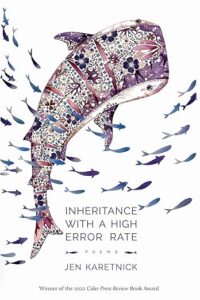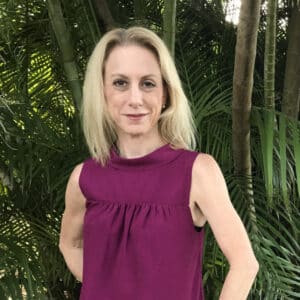Jen Karetnick has a marvelous eye for image and metaphor.
I’ve read several of Jen Karetnick’s poetry collections over the years, and I’ve come to expect an expert eye for image and metaphor. With five poetry collections, poems published in a host of literary journals and magazines, and several prizes for her work, you would expect her to know how to use words and language. Yet she always manages to go beyond the expected, with images that intrigue, challenge, sometimes jar the mind.
Her latest collection, Inheritance with a High Error Rate, does not disappoint. Whether she’s writing about a deceased brother, the symphony of a tropical storm, selling a waterfront home in Miami or 10 things you don’t know about the city, or being followed by @Death on X (formerly Twitter), she surprises and delights with how she makes sense out of marrying two very different ideas or words together.
How about an octopus finding a coconut? Or sitting shiva for a village? Or the screaming music accompanying yard work? Have you considered the full silver coin of the sun or the scuttle of cloud cover? Or listened to the “slowdown swoosh” of a dropping mango? It’s this sense of the surprising that she brings to her poems, whether she’s writing about family, Florida, growing up, nature, or that green iguana who steals a swim in the backyard pool and leaves the evidence behind him. I read that poem so many times that I’ve become quite fond of that green iguana.
Karetnick works hard at these poems, but one senses she’s also having a great deal of fun. Glaciers can calve much of their weight, poems linger in the water like sonar, and whales, well, do you know how whales can best be described?
In the Photic Zone

so much of their weight that the matter
of my home changes state, bring me
the whales, those Cuisinarts of the ocean,
flat beating the layers of the sea
like cake batter with each deep
dive and sound, icing the surface
with expulsions of iron-rich
excrement that feeds the drift
of sunlight. What we think we own
will no longer be ours to claim,
but the leaves of every book
we’ve ever read, libraries
of poems lingering in the water
like sonar, will green
and green and green and green.
This poem, like all the poems in the collection, linger in the water of the mind, exactly like sonar, echoing.

Jen Karetnick
Karetnick received an MFA in poetry from the University of California-Irvine and an MFA in fiction from the University of Miami. She is the author of several poetry collections and chapbooks, including Prayer of Confession, Landscaping for Wildlife, Bud Break at Mango House, Brie Season, and Necessary Salt, among others. Her poetry published in numerous magazines, she’s received the Tiferet Poetry Prize, Hart Crane Memorial Prize, the Romeo Lemay Poetry Prize, and the Anna Davidson Rosenberg Prize. She’s also received fellowships and residencies at the Vermont Studio Center, Wildacres Retreat, Mother’s Milk Artist Residency, Artists in Residence in the Everglades, and others. She lives in Miami.
Inheritance with a High Error Rate is a poetry collection full of the enjoyment life, deep perceptions of nature, arresting imagery, and the occasional bit of fun. Karetnick has done well here, very well indeed. And she’s given us that green iguana, sneaking his way into the pool, enjoying every minute of stolen please.
Related:
Jen Karetnick: Pondering the Often Invisible.
Poetic Voices: Jen Karetnick and E. Kristin Anderson.
Ocean as Metaphor: The Crossing Over by Jen Karetnick.
Photo by Marc Veraart, Creative Commons, via Flickr. Post by Glynn Young.
How to Read a Poem uses images like the mouse, the hive, the switch (from the Billy Collins poem)—to guide readers into new ways of understanding poems. Anthology included.
“I require all our incoming poetry students—in the MFA I direct—to buy and read this book.”
—Jeanetta Calhoun Mish
- Longfellow’s “Paul Revere’s Ride”: Creating a National Legend - April 17, 2025
- Poets and Poems: Katie Kalisz and “Flu Season” - April 15, 2025
- Poets and Poems: Michelle Ortega and “When You Ask Me, Why Paris?” - April 10, 2025


Leave a Reply